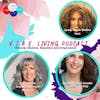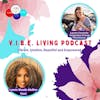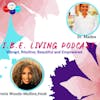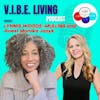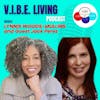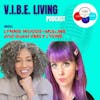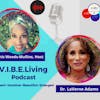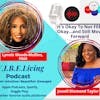Age Agitators: Redefining Midlife Joy

IN this podcast we explore the power of storytelling, the importance of embracing change, and practical tips for living a playful and fulfilling life at any age.
My guest Yvonne Marchese is the host of the Late Bloomer Living Podcast and the author of In Full Bloom: A Guide to Aging Playfully.
Yvonne is a true "Age Agitator," believing that midlife is a time filled with possibility and that it's never too late to pursue our dreams. As the President of the Age Agitators Club for women, she is on a mission to help us rethink and redefine what's possible as we age.
In this episode, Yvonne shares her inspiring journey and insights on how late bloomers can thrive in midlife. We'll explore the power of storytelling, the importance of embracing change, and practical tips for living a playful and fulfilling life at any age.
Get ready to be inspired and empowered to bloom beautifully in your unique way.
Tune in for this enlightening conversation with Yvonne Marchese.
Bio
Yvonne Marchese is the host of the Late Bloomer Living Podcast, and author of In Full Bloom: A Guide to Aging Playfully. She is a roller-skating, paddle-boarding “Age Agitator” who believes that midlife is filled with possibility, that it’s never too late to pursue a dream, and that the stories we tell ourselves have tremendous power in our lives. She is on a mission to help people rethink and redefine what’s possible as we age. She is also the President of the Age Agitators Club for women. Social Media
Websites: https://latebloomerliving.com and https://www.yvonnemarchesephotography.com/
Bloom Book Amazon Link
https://www.instagram.com/latebloomerliving/
https://www.facebook.com/latebloomerliving
https://www.linkedin.com/in/yvonne-marchese-85111751/
YouTube
https://www.youtube.com/channel/UCfiTxGUiWThacEpBFKOvoKQ
--- Send in a voice message: https://podcasters.spotify.com/pod/show/vibelivingpodcast/message
Please like, comment, share, and subscribe to the podcast.
If you would like to be a guest on the V.IB.E. Living Podcast please email me lynnis@vibewellnesswoman.com.
To find out more about Lynnis go to linktr.ee/Lynnis
Yvonne Marchese – Transcript
Lynnis: [00:00:00] into this whole late bloomer living. And what does that mean? What does late bloomer mean to you?
Yvonne: Well, I think everybody is a late bloomer in some way, shape, or form. Even if they don't want to claim the title of being a late bloomer. I think that, you know, you've got people that might be just rock stars in their career.
And maybe their private, their personal life is something's a little twisted, or they've got health issues that they're facing or something. There's always something where we can, we can bloom.
Lynnis: Hi, I'm Linus Woods Mullins, and I love to help women to vibe, to be more vibrant, intuitive, beautiful, and empowered in their life. So come on, let's vibe.
[00:01:00] I love what I do because I get a chance to meet such fantastic women, women who have gone through special challenges in their life and they take those challenges and then apply them to helping other women. There's nothing like on the job training as it were, and absolutely Yvonne Mar kay ze and please,
Yvonne: am I saying that correctly?
It's Yvonne Mar kay ze.
Lynnis: Okay, Yvonne Marchese. Thank you. Yvonne Marchese is the founder of Lake Bloomer Living. And she is fantastic. She has a podcast called Lake Bloomer Living Podcast. And she's also author of In the Full Bloom, A Guide to Aging Playfully. She's a roller skater. She does paddle boarding.
And she calls herself an age agitator. We're going to find out what that means in a minute. But I'm just so excited too. Have her here on the podcast because she's on a mission to help people rethink and redefine what's possible as we age. So [00:02:00] Yvonne, thank you so much for being here on the live living podcast.
It's wonderful to have you here today.
Yvonne: Thank you so much. And thank you for the wonderful introduction. I love that. Yes. I am a roller skater. I am a paddle boarder and I am on a mission.
Lynnis: You know what? I paddle board too. Do you? Yeah. My daughter lives in Florida and we go paddle boarding. She has two paddle boards.
So that whoever's visiting her, that's one of the things they have to do, whether they want to or not, they have to go paddle boarding. And so we did. In fact, I was in in Florida for about oh, maybe about four months this summer, just hanging out in her condo, paddle boarding and having a great time.
And
Yvonne: it was so much fun. That sounds like heaven to me, honestly. I'm like, Oh my gosh, let's go.
Lynnis: Yeah, really? Absolutely. So tell me, how did you get into this whole Lake Bloomer living? And what does that mean? What does Lake Bloomer mean to you?
Yvonne: Well, I think everybody is a late bloomer. In some way, shape, or form, even if they don't want to claim the title of being a [00:03:00] late bloomer.
I think that, you know, you've got people that might be just rock stars in their career, and maybe their pri their personal life is, something's a little twisted, or they've got health issues that they're facing, or something. There's always something where we can, we can bloom. We can reinvent ourselves in some way, shape or form.
And I started the podcast because I had a personal breakthrough and I feel like a late bloomer. And the breakthrough came about the end of my forties, about the time I was 48 when I was really at a low point. My entire decade of my forties was Riddled with minor health challenges from bursitis in my shoulder to bunions to a melanoma on the bottom of my foot.
Bizarre, just strange [00:04:00] little things. And I would look in the mirror, which started in my early 40s, and I'm looking at this person that I don't recognize. And I'm like, who is that old woman? And That I carried with me all through my forties, not really thinking about it. Linus, it just was there. What happened was when I was 48, I was really feeling lonely, foggy, just, I felt like a bit of a failure.
It was just all kind of coming down on me at that point. And I was really looking for solutions. My husband, knowing that I was on this quest suggested that I listen to the five second rule by Mel Robbins. Which blew open my mind because I could relate to so much of what she was saying and a lot of her experience was about hitting the snooze button in the mornings and starting off behind the eight ball before she ever had a [00:05:00] chance to get rolling.
And I was like, that's me. I do. I never wanted to get up in the morning. I would hit the snooze button over and over and over and then I'd be frustrated with my young kids. for not getting ready quick enough in the morning. And who was the real problem? Hello. Let's point the arrows right at me. Okay. And in fact, one morning I was yelling at my son, and by the time we got to the car, I looked in the rearview mirror, I saw these big fat tears in his eyes, and I, that's when I knew that I needed to change something.
So, I decided to stop hitting that snooze button, and get up an hour before my kids and my husband every day. And I gave myself the mornings to do meditation and move my body somehow. And it was a 30 day challenge, just to see what might happen. It was really hard because I was a person who stayed up late editing photos.
I'm a photographer, so I'd stay up late working after the [00:06:00] kids were in bed. It required an entire shift of. When I went to bed and when I got up, but I'll tell you the, after a couple of weeks of doing it, I was feeling the difference. I felt more energy and I was starting to feel more hopeful. And that was like, what is, what is that about?
Why am I feeling more hopeful? What I realized was that I was starting to feel hopeful about my future because I felt better than I had felt all through my forties. That hopefulness was like, Oh, if I can feel better and it's not all downhill, what might my next 20, 30, maybe 40 years look like what's possible?
And I started to get curious.
Lynnis: Yeah. Yeah. It's interesting. So many of the women I work with are at that point of their aha moment between 45 and 55 something clicks and they either rise to the call. [00:07:00] Or they don't. But wouldn't it be wonderful and what a different world we'd have if all women, when they were in that stage, decided to go ahead and rise to the call and find out what it is they're supposed to be doing that they either haven't done before, didn't get a chance to do, put it off, or have always dreamed about doing but never had a the confidence or the umph to actually do it.
Your story is so similar to mine because I went through something like that at 51 and decided the only way that I could really peel back the layers to find out what was going on with me was to leave my corporate job and to peel back the layers and get well because I had an anxiety disorder. That was my you know, psychological complication, which over time became a physical complication because I would wake up in the morning, every morning, scared to death.
Full of anxiety. I felt like I was going straight downhill in a roller coaster with no restraints. That's how it felt every single morning. And the only thing that would take it away was coffee. So finally I was like, wait a minute, this [00:08:00] isn't normal. And I had epiphany, took some time off and it was time for me to go back to work.
I said, I'm going to get well, and then I'm going to figure out what I want to do when I grow up.
Yvonne: Exactly. That's a question I'm still asking myself, Linus. I'm 55 now. And now though, I have to say that started, I had a career in the theater up until the time I was 35 and I had kids for the first time. And once I had my first child, I realized I was well and truly done with theater.
I didn't even want to do it anymore. And it had been everything I'd ever wanted my whole life. So for five years, I was in. A quandary about who I was and what was I going to be when I grew up? Because I had never considered anything else. It was a real identity loss. And I I've asked that question at that point in my life.
And again, into my [00:09:00] forties, what am I going to be when I grow up? I did end up finding photography, which really saved me. I turned, I became a photographer at the age of 40 and that was an aha moment of its own. By the time I had this other epiphany, which led me to Late Bloomer Living, that was eight years later.
And now I ask the question, what am I going to be when I grow up? But I don't ask it with a sense of impending doom. I ask it with a sense of, like, curiosity and like, ooh.
I
Yvonne: don't know. I don't, I really don't know. I don't know where I'm heading next. Isn't that
Lynnis: exciting? That is exciting. In fact, what is exciting about this particular point in your life that keeps you wanting to, you know, rediscover yourself?
What is it?
Yvonne: What is it that keeps me wanting to rediscover myself? Hmm. I guess what inspires you? What inspires me is [00:10:00] The possibilities of it, the wide, I guess it's like learning to embrace uncertainty instead of dreading uncertainty. The uncertainty is always going to be there. So I like the mental gymnastics and the spiritual gymnastics, if you will, of the, and I think meditation has led me to a lot of this sitting with myself every morning and I literally meditate every day, sometimes more than once a day because I find such freedom in it.
And. It just opens me up to being less reactive and more curious about what's going on inside me and what's possible
Lynnis: for life. You know, it's interesting because we spend so much time doing things, especially during our child growing stages, you know, in [00:11:00] the fifties, there's so much it's automatic. And we're thinking like, you know, five days ahead.
Thinking about what happened behind when, why could we change that? All about control, control, control. As you get older, I believe that you begin to realize that staying present is what serves you best because you've learned now because your wisdom, you can't change the past. And you certainly can't predict the future.
So why not enjoy, you know, this moment in time? So when it came to meditation, how did you learn to be still enough to, to go inside? What, what were the tools you used to
Yvonne: help you get there? I used the 10 percent happier app. I had a, I also had some some meditations that were 20 minute meditations that I had been doing for years.
I just didn't do them every day. I knew it worked for me. I knew it made me feel better. I just didn't feel like I had the time to do it. Using the 10 percent happier [00:12:00] app was great because now I sound like I'm doing an ad, but it was great because they have five minute meditations, 10 minute meditations.
You can literally go in and, and kind of grocery shop for the meditation based on, okay, am I feeling anxiety right now? Am I feeling you know, do I need a little bit of self compassion? Do I just, and you can look up all the things and kind of go, okay, let's try this for right now. And five minutes, if that's all I had, then it was a five minute meditation.
And that was okay. And I was like, I'm okay with that. As long as I do it every day, and I slowly started to build up the muscle of being able to sit longer and longer. I've since discovered insight timer. There's a ton of favorite meditations that I have on there. And sometimes I will just sit with some, some.
Quite some like music that's just like a meditative got a meditative groove to it. And i'll do that, but I do find guided meditation works for [00:13:00] me I have a friend who says she she can't even begin to do guided meditation She's just got to sit and do her own thing. I think everybody's in their own way Everybody's a little different and that's a
Lynnis: good point because there are different kinds of meditation.
It's not just one thing We just have to sit and You know, that move and
Yvonne: clear your mind, people think they've got to not think and it's like, no, it's not about like, in fact, it's more like just watching your thoughts, just letting them and letting them be there, but not holding on to them and not trying to push them away.
And the less you try to control, the freer it starts to feel.
Lynnis: Yes, I. I like to compare it to the idea of opening a sliding glass door. You know, you open it, you close it, you open it, you close it. So the thoughts, they come and they go, they come, they go. And after a while, you're noticing the thoughts come and go, but they're not a distraction.
They're just kind of there. I, I like guided meditation too. And it has made a huge difference in my life when it [00:14:00] comes to anxiety. I am now about 98 percent anxiety free, but it took a lot of different holistic tools for me to get there. And people have asked me what motivated me to, you know, keep trying after having dealt with anxiety for like years.
And even though I had anxiety, I just thought this way it was supposed to be. But I think what motivated me was getting to the other side of it. You know, and doing something different than what I've done before this is time to disrupt, you know, what it was and how I have been living and figure out another way to live.
It kind of reminds me of the whole concept that you came up with the idea of being an age agitator. Why do you call yourself an age agitator? What is that?
Yvonne: So, part of the aha moment, when I started feeling better and then I started getting hopeful about my future, the aha moment was that I had been beating myself up about aging.
I had been, it was like I was yelling at [00:15:00] myself for aging. It was like every time I looked in the mirror and I saw things I didn't like, it was, it was evidence of decline. I was, you know, I've always been more afraid than age, of aging than I have been of death. Let me just say that. And the reason I've been afraid of aging is because I thought, okay, it means a lack of independence.
I'm going to, I could very well not be able to move my body the way I want to. Their mental decline scares the heck out of me. And I'm not, it's not that I'm not afraid of of aging anymore. It's just that now I'm in an inquiry into it. And so the agitation around age agitating is all about stirring the pot a little bit to look at, well, okay, if the worst case scenario happens.
If my body doesn't cooperate with me, despite all my best efforts to take care of myself, what then? And I'm now [00:16:00] looking at it going, I'm really resilient. I can look at all the evidence of my life experience and all the things that have happened to me. And go, Yep. I bounced back from that. Yep. I survived that.
Yep. And not only that, but I have come back stronger from every single challenge that has come my way has built me into a stronger version of myself. And that is like, wow. Okay. Bring it if if something happens, I think i'm gonna be
Lynnis: okay You know, yes, that's one of the wonderful things about aging is the wisdom, you know Hopefully you've grown past what I call your hair on fire moments, you know when you're in your 20s in your 30s Because you're still experiencing first time stuff.
Some of it's, most of it's traumatic on what, you know, on different scales, but it's still a form of trauma. By the time you get to your 50s, hopefully most of the hair on [00:17:00] fire moments have left. But definitely 60, I'm telling you. This side of 60 is I'll be 67. I have to, you know, I have to go and subtract my age the other day.
I'm 67 or 68. I'm 67. I'm lucky
Yvonne: this year because I'm 55, so it's like double nickels and everything is a really weird
Lynnis: thing to track. But the two sixes, I'll be with 67. And, it's amazing how my wisdom has made me really appreciate the idea of aging. Because if you're aging, that means you're not dead.
That's why I could never understand the concept of anti aging, even when I was younger. Because, okay, if you're anti aging, that means you're against living. I mean, what? I don't get it. Why not embrace, why, you know, many times the messages that our society sends us, you know, begins to give us the same impression that what you were talking about.
That it's a bad thing. That it's going to come with all these other issues of
Yvonne: concern. It is [00:18:00] absolutely everything about what we all fear about aging. It's because we're steeped in it. You, like you said a moment ago that you didn't even realize that you had anxiety because it was just, you were just like, well, this is just normal.
That is what ageism is. around us all the time. It's the if you start to become aware of it, almost can't not hear it in a conversation with somebody when they say something like, Oh, I'm having a senior moment. Oh you know, I am 29 again. Oh, I'm dating myself. All the little things that come up that just have that implication that aging itself is a bad thing.
And it's all around us and it's like we're the goldfish in the water and we don't even know we're swimming in the water. And when you start to realize that [00:19:00] that's what the water is, then you've got some choice in the matter over what you're going to do with that information. And
Lynnis: how you wanna react.
You know, one of the things I love about your philosophy is that not only are you an age agitator, but you wanna have fun while doing it. You talk a lot about the importance of play, and you know, it's so interesting because I have thought about this before, but not nearly as much as you have, but the fact that at some point we stop playing.
sooner than men do. I mean, men still play. I mean, they sit down, they watch basketball, they throw the football, you know, they do certain things, right? Whereas we're cleaning, taking care of kids, giving baths, doing all this stuff, but we're not like playing with dolls or you know, playing kickball or anything like that.
We are basically working all the time. So how do we get back to that? How do we get back to the idea of playing?
Yvonne: [00:20:00] It's as much a mental game as it is, Actually playing so I'll say that I'm I'm in the middle right now of a of a challenge for them for the month of February. I don't know when when this episode is going to come out.
But here we are talking in February of 2024 and I'm doing a 29 day challenge to live. And it's called living playfully at any age and my challenge to myself is to find playful moments. All day, throughout the day, it's to re, re jigger and do a little bit of judo with the work that I need to do, because I, I have a lot on my plate, I, and it's all self imposed, I, I'm the one who started the podcast, I'm the one with the photography business, you know.
And so when I look at the tasks that need to get done for my business, sometimes it's overwhelming. And my [00:21:00] challenge to myself is how can I reframe the way I'm thinking about my business and remember that I get to do this. I don't have to do this. And how can I go into my tasks for the day with the, with in mind that I'm actually, there's a reason I'm a photographer.
And there's a reason I have a podcast and that's because I'm a storyteller. I love telling stories and yes, there's things that need to happen around that. And yes, I've got to pay my taxes and all the other things. Right. But how can I, how can I. Sort the mail playfully. Like if I've got to go through all my piles of papers and start sorting things for taxes, I, I did that this weekend and I put on my pink playlist and I stood around the living room or the dining room table and I sorted the mail while I was dancing.
And I, and I, you know, raise a movie
Lynnis: that you're saying this. [00:22:00] I, I think I need to hear this today about playing because I was just talking to my therapist. I, yes, I go to therapy once a week. I believe in that. It's just like going to the doctor, the dentist or your hairdresser. You got a therapist. I said, you know, lately I've been procrastinating a lot and I'm not a procrastinator.
And my procrastination is someone else's. You know, 8 hour workday, but you know, I know when I'm slipping the levels, I'm trying to figure out what it is. And she says, well, do you think you're a little burned out? And I said, no, it's not that. She said, do you feel like you're depressed? I said, no, I don't really feel depressed.
It's just that, some days, I'd rather play. I know what my deadlines are and my husband will come to my office. He stands right there at the door of like once or twice a day. And he says, so how many more hours are you going to be working? And I look at my schedule and say, well, really not, don't have to work right now.
I finished my appointments and I know when the other stuff is due. What do you want to do? He says, let's go to the movies. But then I would always feel a little guilty about it. [00:23:00] Those are the grindstone. I said, wait a minute. One of the main reasons why I got into this was I didn't want to do that corporate thing anymore, but the first shoot 14 years of my business, I was doing that for the most part.
And I finally got to a point. I just got to the point after talking to my therapist yesterday that I am going to have official play dates with my husband And that's okay. You know, it's
Yvonne: not just okay, it's imperative. I think it's imperative. The other day, you know, I had work to do, so I did, it was a weekend and we've had all these gray days, you know, for the, through the winter, but the sun was out and we, it was in the fifties and I just went, Oh, I've, I've got to go roller skating and I have to go roller skating right now.
Right now. See,
Lynnis: there you go. I just found out today that part [00:24:00] of my medical benefits is that I have all these virtual dance classes I could be taking and I'm a dancer, I'm a dancer in my other, professional dancer in my other life. You know, you know how we have three, four lives. And I stopped dancing when I turned 60.
I said, I want to be one of those ladies like when she really needs to get off the stage, so I stopped dancing publicly, but I decided that I wanted to get back into shape dancing, and I'm going to start dancing again. I said, but where can I find a class that will, you know, I'm an experienced dancer, but I don't want to hop right into intermediate.
Going to beginning level would be boring. Well, I found out for a senior citizen because I am a senior citizen I guess and that's fine Do you want to call myself that? That's fine But they have dance classes for dancers who used to be dancers who want to get back in shape as dancers I found that it was a benefit that my insurance company had.
I didn't even know about it. That's amazing! Yes, sometimes we have these resources that we just don't look into because [00:25:00] we get so busy thinking about what we're not doing, what we don't have or whatever, and we just miss the boat, you know, dismiss the boat totally. I've had these benefits available to me for like five years, didn't even know about it, but right there in the back door, but I think it started with a change of mindset.
because I noticed that something was off and I needed to start figuring out what that was. And after my conversation with my therapist, I started looking for more ways to play.
Yvonne: And then I got a good hint for you, a good tip for anybody who is looking to incorporate more play to basically raise your vibration, which is great that we're on your podcast, right?
This is the vibe living podcast. So if you want to raise your vibe, which is really what this is all about. What I'm doing is to raise my vibration as often as I can every day, make a list of what gives you energy and it can especially little quick things that are free and [00:26:00] easy to do in like A minute, five minutes or less.
It could be dancing to your favorite music. If you're in the middle of a work day and you're starting to feel, Oh, you, Oh,
Lynnis: okay.
Yvonne: Stop. Wait a minute. Dance break. You know, it could be anything like it could be meditation. I call meditation play. If it's just a moment to stop and pattern, interrupt yourself from being in grind mode.
Lynnis: Right. Which we can get into. And, you know, I don't believe in coincidence. There's no coincidence here that we haven't been talking about this thing. It's just more confirmation, which I look for all the time. I look, there's signs everywhere. If you want to know if you're on the right track or not. And I think one of the first signs that we began to feel or to see is what's going on with our bodies.
We get these little nudges or things that going out like what happened with you. And, you know, it was so fortunate that you stopped and said, [00:27:00] wait a minute. Let me figure out what's going on. And if there's nothing else that, you know, women who listen to this podcast or anybody who listens to this podcast and take away from it is the idea of stopping and figuring out, okay, what's going on with me and where can I incorporate something fun and playful to help me get through some of these things?
Because we, sometimes as women, we're just a little bit too darn serious. You know, it's not that serious. And when you think about, All that we have survived at this point we've seen so much, we've done so much, it probably isn't a lot of things we haven't seen or done yet. So therefore, why not go ahead and enjoy this phase of our lives instead of living in trepidation about what's to come?
Because we may have not done every single thing, but we've probably done most of the categories. And we survived them. So why not go ahead and enjoy life? That's why I love what you do. And I love your community. Tell us about your community that you've put together on top of everything else that you've done.
[00:28:00] I love it. I
Yvonne: love it. It's the age agitators club. It used to be called midlife uprising, the midlife uprising community because I had a It started with a summit that I hosted back in 2022, and I had 30 amazing speakers who came and just, it was, it was awesome. And I realized that I, what I loved about that experience was the community part of it.
And so a couple of months later, I decided to start the community. And then I came up with the age agitators thing and I went, Oh, that's got to be the new name. So that is the name of it. We meet once a month on zoom and. And it's basically bringing together like minded women. Who are ready to challenge all the assumptions that of the water that we've all been swimming in for all this time and take another look at what's possible as we age and do it in a fun way.
So, I. Kind of usually start off those meetings with a little [00:29:00] meditation. That's really quick And then we do x like some little fun exercise and there's a lot of conversation around it and that's yes
Lynnis: It was great such a great group of women and for those of you listening on the podcast On the show page are all of Yvonne's links, including the link to her website where you can sign up for a trial run to see how you like the community.
Her podcast is there and the book. Your book is lovely. Tell us about your
Yvonne: book. Thank you. It's called in full bloom, a guide to aging playfully. And just so you know, I already wish I had a different subtitle to that book. I wish the subtitle was a guide to living playfully at any age, because ageism goes all kinds of ways.
It goes backwards. It goes forwards. There was a whole time of my life when I was young and I was telling myself I was too young to do things. And then in a flash, I felt like I was too old to do things. So,
Lynnis: it's [00:30:00] funny how fast the time goes. In fact, look at us. The time is gone by so fast. Yvonne, thank you so much for being on the Vibe Living podcast.
It's been wonderful
Yvonne: having you here today. Thank you so much for having me. It's been a blast. Well,
Lynnis: thank you. And thank you to all of you who are listening. Thank you for putting me up in the top 10 percent of Apple podcasts. We're working on getting up to the 5%. So, please. Like, like the podcast, comment on the podcast, subscribe to the podcast, share the podcast.
We want to grow this. I know you believe that the whole concept of vibe is a movement whose time has come. There's no reason why we can't make it a priority to enhance our vibrancy, to increase our intuition, to work on our inner beauty so it radiates out, and to feel empowered to live a great vibe life.
So thanks so much for listening. It's been wonderful having you here. Have a fantastic week. And don't forget the vibe. Bye bye, everybody.
Thanks for listening to the Vibe Living Podcast. And don't [00:31:00] forget to subscribe, like and comment and share this podcast. Have a fantastic day and don't forget the vibe. Bye bye, everybody.













